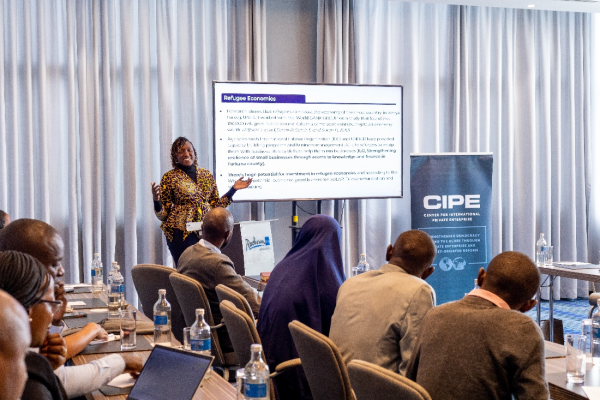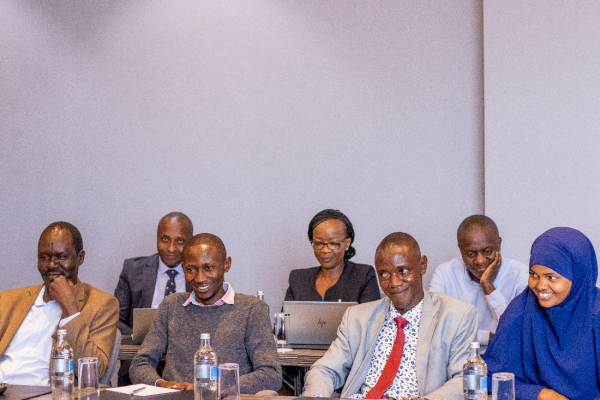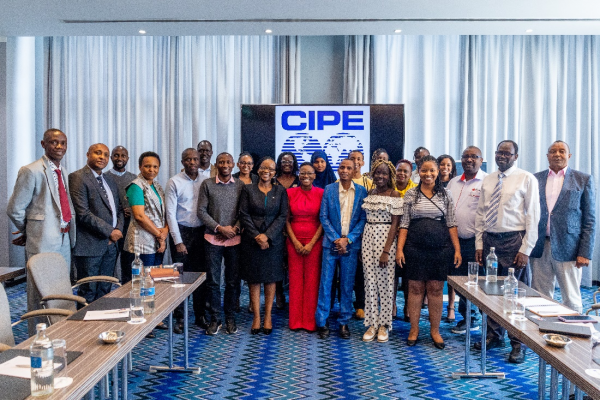Refugees are typically a group of people shut out from economic opportunity and the political processes that affect their lives. Enhancing the self-reliance of refugees is crucial to achieving a more inclusive and democratic society. CIPE draws on 40 years of lessons learned across the world to support refugee entrepreneurship as a path toward economic and social integration.
CIPE has worked with refugees in diverse settings, including the dense urban neighborhoods of Istanbul, Turkey, and the remote, arid landscape of the Kakuma Refugee Camp in Kenya, which hosts over 165,000 refugees and asylum seekers from more than ten different countries, most prominently from neighboring South Sudan and Somalia, as well as the Democratic Republic of the Congo, Ethiopia, and Burundi.
Nyanen Malik Juch of the Global Shapers Kakuma Hub, on the importance of financial inclusion.
Despite the poverty endemic to refugee camps, and economic obstacles such as the lack of legal documentation and scant access to financial services, Kakuma is home to more than 2,500 businesses and an economy worth about $16.5 million as of 2017, according to a study by the International Finance Corporation (IFC). It even has a central business district: the IFC’s researchers found one section of the sprawling camp so dense with shops and traders that its residents named it “Hong Kong.”
This economic potential is one reason the private sector has an important role to play in addressing the global refugee crisis: refugee entrepreneurs need access to financial services. Basic banking services are available in Kakuma, but banks, microfinance companies and other financial institutions are crucial in creating an enabling environment for refugees in these fertile spots – thereby building more sustainable economies for refugees and host communities alike.
Josephat Ekato, Chief Operating Officer of the Turkana Chamber of Commerce, speaking about how the Chamber is supporting refugees.
To realize the potential of camps like Kakuma, policymakers must address obstacles that deter financial service providers from investing in refugee economies, and host countries must amend regulatory frameworks. Former CIPE Youth Leader Doris Mwikali conducted a project as a part of the CIPE Youth Leadership Program in 2021 to foster financial inclusion of refugees and vulnerable groups in the host Turkana-West community, near Kakuma, as well as to build greater awareness of business potential in refugee communities. Her project helped five refugee entrepreneurs in Kakuma to access credit, and connected an additional fifteen refugee youth entrepreneurs to stakeholders in the private sector and civil society through online workshops.

After those initial successes, CIPE and Mwikali organized a multistakeholder forum in Nairobi, Kenya on March 17, 2023, to help lenders understand refugees. The forum brought together thirty relevant stakeholders from the Turkana County business community, the Turkana Chamber of Commerce, the Microfinance Association of Kenya, researchers from Oxford University’s Refugee and Forced Migration Studies program, the Kenya Bankers Association, and four refugee leaders from the Kakuma Refugee Camp. The multistakeholder dialogue generated the following call to action for policymakers and other stakeholders to create an ecosystem for the financial sector to invest in refugee economies in Kenya. The three recommendations within this call to action will be distributed among the participants’ networks as well as with representatives of the Kenyan government.
1. Policymakers must address refugees’ lack of documentation. The government should:
- Develop clear policies and regulations for financial institutions on alternative documentation to comply with “Know Your Customer” regulations required by the Central Bank of Kenya. A clear policy framework on alternative documentation will allow lenders to leverage the use of biometric identification data, incentivize the development of blockchain-based identification solutions, facilitate the use of community-based verification systems, and develop alternative credit scoring models that allow banks, microfinance companies, and others to assess the creditworthiness of refugees based on available context data, such as mobile

Refugee leaders Innocent Havyarimana and Shukri Ibrahim Mohamed front right, and others. money usage.
- Harmonize the different identification documents currently used by refugees in Kenya and provide clear direction to lenders on which are acceptable. Policymakers should match a person’s proof-of-registration card with their alien card to ensure that the identity of refugees is consistent across government systems, making service access easier for refugees and reducing the risk of identity fraud.
2. Government and development partners must engage in capacity building to help lenders understand and invest in Kenya’s refugee economy. The forum highlighted the following areas of investment:
- The Kenya Bankers Association,Microfinance Association of Kenya, and Oxford University Refugee Led Research Hub called for investment in market data research to advance their members’ understanding of market demand, identify gaps and opportunities, facilitate risk assessment, and provide data to design financial products that refugees need.
- Microfinance institutions called for development partners, such as the International Labour Organization, to increase funding for building the capacity of banking personnel in order for them to develop a deeper understanding of refugee communities and debunk negative stereotypes, such as that refugees are too dependent on humanitarian aid.
3. Lender-refugee partnerships must be formed to build trust and credibility. The refugee leaders highlighted the following strategies financial service providers should pursue to ensure meaningful community engagement:

- Engage with refugee-led organizations such as the Kakuma World Economic Forum Hub, which advocates for the socio-economic rights of refugees, to better understand the refugee community’s needs and expertise.
- Work with development partners on financial education programs and entrepreneurship training for refugees.
CIPE and the participants of this forum urge Kenyan policymakers and other stakeholders to adopt the three recommendations outlined in this call to action. These reforms will meaningfully increase access to sustainable livelihoods for refugees and ultimately strengthen Kenya’s democracy.
Published Date: July 14, 2023
